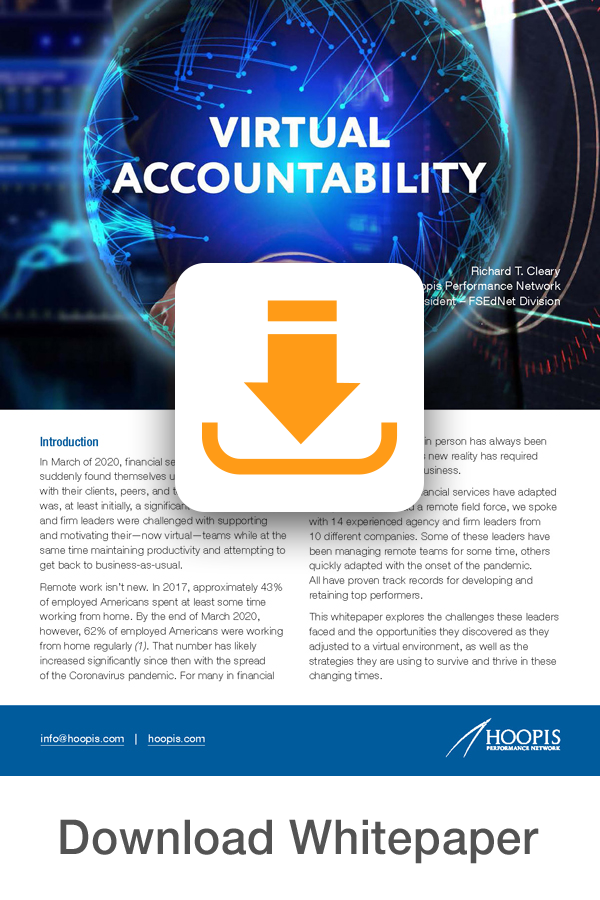Virtual Accountability

Introduction
In March of 2020, financial services professionals suddenly found themselves unable to meet in person with their clients, peers, and teams. For many, this was, at least initially, a significant disruption. Agency and firm leaders were challenged with supporting and motivating their—now virtual—teams while at the same time maintaining productivity and attempting to get back to business-as-usual.
Remote work isn’t new. In 2017, approximately 43% of employed Americans spent at least some time working from home. By the end of March 2020, however, 62% of employed Americans were working from home regularly.
That number has likely increased significantly since then with the spread of the Coronavirus pandemic. For many in financial services, where meeting in person has always been considered essential, this new reality has required rethinking how they do business.
To see how leaders in financial services have adapted their processes to lead a remote field force, we spoke with 14 experienced agency and firm leaders from 10 different companies. Some of these leaders have been managing remote teams for some time, others quickly adapted with the onset of the pandemic. All have proven track records for developing and retaining top performers.
This whitepaper explores the challenges these leaders faced and the opportunities they discovered as they adjusted to a virtual environment, as well as the strategies they are using to survive and thrive in these changing times.
Key Takeaways for Leaders
- Focus on the three E’s of the accountability framework: Expectations, Encouragement, and Environment.
- Create a structured and consistent communication strategy.
- Help people learn remote work skills.
- Sharpen your observation and listening skills.
- Foster team interactions.
- Leverage peer-accountability groups.
- Practice care and candor.
Create a Framework of Accountability
In business, we often speak of “holding people accountable.” And, certainly, there are consequences for team members who do not fulfill commitments or meet required productivity levels. But, for most leaders in financial services, the goal is not to hold others accountable, but rather for their team members to embrace personal accountability and ownership.
Personal accountability means delivering on a commitment and accepting responsibility for the outcome. It is the internal force that drives agents and advisors toward their goals. Leaders in our research understand that fostering personal accountability is the key to long-term success. They do this by creating a framework of accountability through:
- Setting clear expectations.
- Providing encouragement and support.
- Creating an environment that promotes accountability.
Setting Clear Expectations
Setting clear expectations has always been an essential leadership role, and it becomes even more important with remote teams. When a team is working together in the same office, it’s easier to correct mistakes and provide prompt feedback. In a remote environment, leaders must be vigilant in communicating and monitoring expectations.
In addition to performance expectations, many leaders have also developed structured communication strategies and rules of engagement for remote work. For example, requiring team members to attend and actively participate in virtual team meetings.
Fortunately, people want to feel connected right now. One leader told us that, before the pandemic, attendance at optional training meetings was around 60%. Today attendance has increased to 97%.
New financial professionals, who aren’t familiar with the level of activity required for success, are particularly vulnerable in a remote environment. Several of the leaders we spoke with provide new agents and advisors with written expectations. One leader uses an operations manual that describes expectations and responsibilities in detail, another provides weekly emails listing the tasks and activities required for the week, and a third leader provides a list of performance criteria that are reviewed at weekly accountability meetings.
Consistency is Key
Frequent and consistent communication is key when working with remote teams, particularly in stressful situations. Financial services leaders have significantly increased the number of touchpoints with their teams now that they are working remotely. Early in the pandemic, some leaders met with their teams daily. Today, many are still holding two to three team meetings each week as well as weekly one-on-one meetings with each team member. One leader told us their daily huddles were so effective, she plans to continue them even when the team is together in the office. The key to these meetings is consistency. Schedule meetings at the same time and on the same day each week and stick to the schedule.
Sharpen Your Skills
Most of the leaders we spoke with feel that communicating with their teams virtually has not posed significant issues. Still, many feel they have had to sharpen their skills in listening, observing, and reading between the lines to assess people’s stress and motivation levels. In one large organization, the managing partners took over running the weekly team meetings to keep their pulse on the culture. One of the managing partners in the firm observed, “It’s easy to hide when everyone is remote. People can fall into a black hole. When we see someone isn’t engaged, we can reach out and find out what’s going on.”
Providing Encouragement and Support
Loneliness and social isolation are two of the most common complaints from remote workers. Extraverts, in particular, may suffer more from isolation if they don’t have opportunities for social interaction with peers in their remote-work environment.
Many leaders agree that what their teams need most right now are encouragement and support. One leader of a large organization told us he isn’t focusing on accountability. He’s concentrating on making sure people feel connected. Managers on his leadership team are each assigned a group of financial professionals to coach and support. The team meets weekly to identify people who may need extra help.
To keep your team engaged, don’t just focus on the numbers during meetings. Use these meetings as an opportunity for people to share their stories and discuss how they’re handling the challenges of working remotely. Keep a positive attitude while also acknowledging the stress and anxiety team members may be feeling.
And don’t forget to have fun. Virtual happy hours have become a regular occurrence in many organizations. One manager hosts virtual trivia games with his team. You can find many virtual games such as bingo, charades, and Pictionary online to add some fun to your next team meeting.
Help Your Team Develop Important Remote-Work Skills
You can help people adjust to remote work by using one-on-one meetings to discuss remote-work skills such as setting priorities and time management. Ask people what they’ve done to improve their remote-work skills each week, and work with them to set goals to become more effective and efficient in a virtual environment.
Some people may feel overwhelmed with so many changes happening at once. To help them adjust, work with them to identify the highest priority tasks. Some teams use a “Start—Stop—Continue” approach to identify priorities. They look at everything going on and ask, “What should we continue doing right now? What should we stop doing? And what should we start doing?”
While starting something new during a major change may seem strange to some, many leaders feel this is the perfect opportunity to introduce initiatives that help people to develop as professionals. One leader asked each person on his team to commit to becoming an expert in a topic and then teaching it to others during their team meetings.
Creating an Environment That Promotes Accountability
Earlier, we defined personal accountability as delivering on a commitment and accepting responsibility for the outcome. Setting clear expectations and providing encouragement and support are the components of the accountability framework that help people deliver on their commitments. Creating an environment that promotes accountability is the component focused on outcomes.
Providing direct feedback via videoconference can be uncomfortable when an agent or advisor isn’t meeting expectations. A few leaders mentioned they are being a bit more lenient than they might have been in the past. “People are facing new challenges both personally and professionally,” one leader remarked. “You have to take that into consideration during coaching conversations.”
Even so, all the leaders we spoke with continue to have regular coaching sessions and difficult conversations when necessary. One leader told us, “Advisors own their business plans. We tell them, ‘We will support and motivate you up until the point we have to part ways.’ But if we get to that point with someone, it’s a mutual decision. We’ve both agreed this isn’t the right fit for them.”
The ability to balance care with candor, as leadership expert John Maxwell says, is how leaders can have tough conversations while maintaining strong relationships. Here are some of the questions he recommends considering when you need to have a caring candid conversation.
- Have I invested in the relationship enough to be candid with them?
- Am I sure this is their issue and not mine?
- Is the issue more important than the relationship?
- Am I willing to invest time and energy to help them change?
- Am I willing to show them how to do something, not just say what’s wrong?
Leverage Peer-Accountability Groups
In addition to coaching sessions, peer-accountability groups are the primary tool leaders use to create an accountability culture. Videoconferencing platforms have made it easy to move these meetings online. Team members use the screen share option to review their weekly activities, discuss challenges, and celebrate successes. A major benefits of holding these meetings virtually is the ability to bring in people from different offices and different locations.
Sometimes all you need to do is make the option available. In one organization, new team members got together and started their own accountability group. That’s a perfect example of accountability baked right into the culture.
For more experienced professionals, some leaders are facilitating weekly practice development meetings where senior professionals share their best practices as well as challenges they are encountering in a virtual environment.
The hallmark of an accountability culture is trust and that hasn’t changed since moving to a virtual work environment. Leaders build trust through the encouragement, support, and, sometimes, tough love they provide their teams. Organizations that had a strong foundation of trust before the 2020 pandemic, have had an easier time adjusting to this new reality than those that did not.
What You Can Do
If you’re struggling with accountability in a virtual environment or simply want to strengthen your current culture, focus on the three E’s of the accountability framework: expectations, environment, and encouragement.
Have you communicated clear expectations to everyone on the team? Are you checking in regularly to make sure people understand and are committed to the expectations?
Do you need to help people remember their “why” or revisit shared values and purpose to gain alignment between their expectations and yours?
Have you created an environment where accountability is the norm? Are you coaching people to success and providing opportunities for them to connect with and learn from others on the team?
Are you encouraging people and letting them know you believe in them and in their ability to adapt to this new situation? Are you checking in regularly to see how they are doing, both personally and professionally?
Finally, are you holding yourself accountable for the wellbeing of your team? Are you maintaining a positive attitude and assuring your team that you will all survive and thrive in this new normal?
Financial services leaders like you are meeting this virtual challenge head-on, overcoming obstacles, and leveraging opportunities. They are proving it is possible to keep your team accountable, motivated, and engaged in this new virtual work environment.
Did You Know?
The number of people who work remotely at least once per week has grown by 400% since 2010.
74% of employees say that a remote work option would make them less likely to leave their company.
72% of talent professionals agree that remote work will be very important for the future of recruiting.
83% of workers say that a remote work opportunity would make them happier at their jobs.
69% of millennials are willing to trade other benefits for a remote work option.
22% of remote employees report that unplugging after work is their biggest challenge.



